Fact-checking claims about AG1


What is it?
AG1 is a powdered greens supplement. One scoop (12 grams, or just shy of 1 tablespoon) is meant to be mixed with 8 oz of water and then consumed.
What are its claims?
AG1 claims it can replace multiple supplements while it "helps meet your foundational health needs."
What the company says it does
AG1 claims that the supplement:
- Supports whole body health
- Covers nutritional gaps
- Delivers optimal amounts of nutrients in forms that help your body thrive
- Supports gut health, boosts digestion, eases bloating
- Helps you feel sharp and focused
- Supports daily energy levels
- Helps you feel calm and relaxed
- Balances the body's response to "various types" of stress
- Helps you feel strong and nourished
- Supports a healthy immune system
While there's not evidence to prove that it can't do these things, there is not proof that it can, either. Most of these are based on loose concepts about qualities that certain ingredients are considered to have. But the product itself has not been tested in humans and confirmed to have any or all of these effects. Most of these are subjective claims. It would be hard to verify them to be objectively true.
Quality claims
The website describes AG1 in the following ways:
- Science-driven nutrition supplement
- Third-party certified
- Trusted by leading doctors and scientists
- 75 ingredients your body can easily absorb
- Continously improved since 2010
- No artificial sweeteners
From a pure fact-checking point of view, I'll address each of these individually.
Science-driven nutrition supplement
"Science-driven" is a marketing term that gives the impression of strong crediblity without having a direct meaning. The concepts behind all multivitamin supplements are science-driven, but this is different from efficacy, effectiveness, or proof that it works.
Third-party certified
Many supplements opt for third-party testing as a way to demonstrate quality. AG1 is NSF Certified for Sport, which is one of the more stringent certifications that a product can get. Since athletes can get in trouble by anti-doping commissions if they are tested and random substances show up, many won't take supplements unless they're NSF-certified. This is one of the more reliable certifications to look for if you're concerned about contaminants.
This doesn't prove that the product works, it only verifies that the product contains what it says it does and doesn't contain unwanted contaminants or substances.
Trusted by leading doctors and scientists
This statement doesn't have any scientific meaning, since "leading doctors and scientists" could mean numerous things depending on the context.
Even if the nation's top experts or influencers endorse a product, that still isn't proof that it works. That doesn't mean it doesn't work, but it's a moot point on evaluation for effectiveness.
75 ingredients your body can easily absorb
This is one of the more interesting claims to me. They haven't individually tested how AG1 absorbs in my body or yours, so it's not a true statement on that level alone.
The other issue is that they haven't published absorption evidence on their 75 ingredients, so we don't really know how the ingredienets absorb for anyone.
When you eat anything, the digestive system engages in a complex process with enzymes, proteins, transporters, and phsyiological mechanisms to break down and absorb nutrients. Context is a crucial consideration for absorption. Some nutrients won't absorb when they're consumed with other nutrients. This is why iron and calcium supplements shouldn't be taken at the same time. Other nutrients enhance absorption, like vitamin C with plant-based iron.
AG1 has 75 ingredients, which is a dizzying amount to try to assess. There's no clear way to determine how it'll behave when it hits the digestive tract, mine or yours.
Bottom line: I have no idea how they concluded that "your body" can "easily absorb" their product.
Continuously improved since 2010
According to their site, AG1 has been updated 52 times.

This can be viewed in a positive or a negative way. If they're updating a formula based on the latest scientific evidence, that's interesting. I couldn't find a breakdown of how they've updated their formula over time (or why).
As a nutrition researcher, I'm curious:
- What changed?
- Did you increase/decrease ingredients?
- What feedback, testing, or data led you to make these changes?
Continuous updates could also come from customer complaints or quality control adjustments. There's no evidence anywhere for this, but when claims are made and there's no data for independent fact-checking or analysis, true research requires consideration of an issue from multiple angles.
If they are committed to transparency and scientific improvement, it would be interesting to see what they've changed and why. But right now, we simply don't know.
No artificial sweeteners
This is a claim that is easily verified from the nutrition label. The product contains no artificial sweeteners.
Customer Reviews
Under FTC (Federal Trade Commission) and FDA (Food and Drug Administration) regulations, supplement companies cannot make claims that their product treats, cures, or prevents diseases or conditions. AG1 highlights the volume of their 5-star reviews across their website (47,281). They also showcase customer reviews, which allows them to imply that AG1 produces these benefits for everyone without directly saying it.
Here are several featured review claims that come from the AG1 sales page:
- More energy
- Morning focus
- Difference in stress levels and overall wellness
- "Huge change" in digestive system
- Workout recovery seems easier
- Consistent energy levels
While these may be true customer experiences, there are so many variables in the lives of these individuals that there's no evidence-based way of knowing if any of the changes they attribute to AG1 actually came from the product itself. Correlation, or an association, between two issues does not mean that there is cause and effect in any direction.
What's in it?
AG1's ingredients list is lengthy, which you'd expect from a product that has 75 of them.
Here's the supplement facts label:
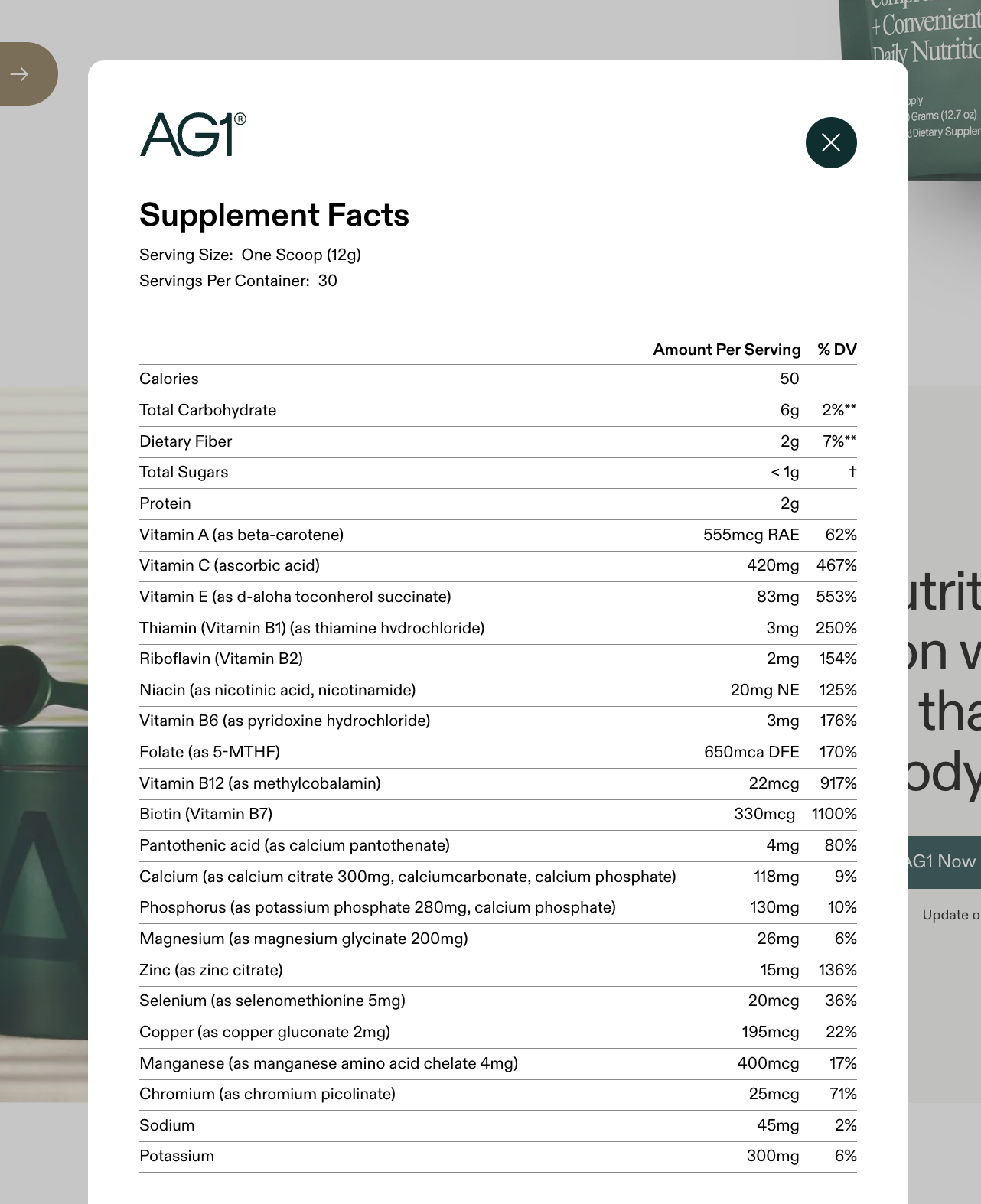

Screenshots of AG1 website. Captured on 9/21/24.
Can AG1 replace several supplements?
AG1's website notes that it can serve as several types of supplements, all in a single serving.
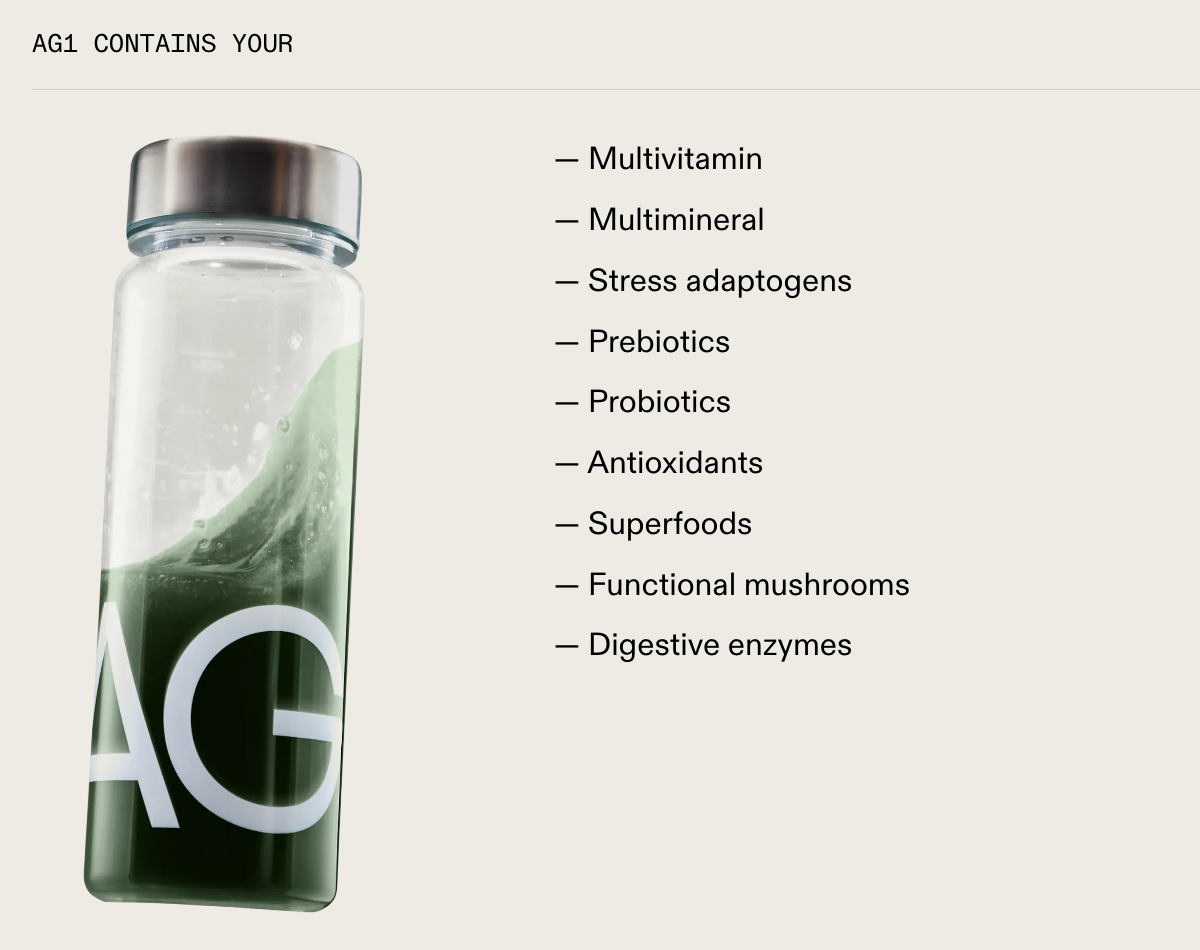
- Multivitamin and multimineral
- Adaptogens
- Prebiotics
- Probiotics
- Antioxidants
- Superfoods
- Functional mushrooms
- Digestive enzymes
I'll address these line by line.
Multivitamin and Multimineral
There's no single standard for multivitamin/mineral formulations. Depending on the brand and who the supplement is designed for, micronutrient percentages and amounts can vary quite a bit, from a few percent daily value to well over 10,000% daily value and beyond.
AG1's claim that it could replace a multivitamin/mineral is technically accurate, although it's important to note that it can't replace a prenatal vitamin — though they're clear that the product is not intended for pregnant people or breastfeeding.
Adaptogens
Adaptogens are herbs that are considered to help the body adapt to stressors. The studies on them have lots of mixed results and various designs, and that level of detail is for a different post. Adaptogens aren't nutritional requirements. AG1 contains a "Nutrient Dense Extracts, Herbs, and Antioxidant" blend, so I can't identify how much of each nutrient is included.
It's not possible to determine if this could replace a standalone adapatogen supplement.
Prebiotics
Prebiotics are types of fiber that nourish gut bacterial diversity in the colon. Inulin is a common prebiotic taken in supplement form. It is included in AG1's "Alkaline Nutrient-Dense Raw Superfood Complex" blend, although it's not clear how much is in a serving of AG1.
It's not possible to determine if this could replace a standalone prebiotic supplement.
Probiotics
AG1 contains 7.2 billion CFU (colony-forming units) of a probiotic blend with two strains: L. acidophilus and Bifidobacterium bifidum. These are strains used in many supplements. Probiotic supplements vary dramatically in the amount they contain. There is no recommended dietary allowance for probiotics.
This could potentially replace a probiotic supplement if you were taking these specific strains.
Antioxidants
These are included in the "Nutrient Dense Extracts, Herbs, and Antioxidant" blend, although some vitamins (like C and E) are also considered antioxidants.
It's not possible to determine how many antioxidants are in this blend or if it could replace an "antioxidant" supplement, but also, antoxidant supplements are not a nutritional necessity.
Superfoods
This is a loose, undefined term. In the AG1 "Alkaline Nutrient-Dense Raw Superfood Complex" blend there are many ingredients that could qualify, but it's not possible to know how much of each individual food is in a single serving.
Superfood supplements are not a necessity and often vary widely based on a brand's formulation and blend. But from a baseline fact, it's not possible to outright state that this could replace another superfood blend on its own.
Functional mushrooms
While it contains a "super mushroom complex," the fact that this is reported as a blend of several ingredients means that I can't really tell you how the amount in this compares to a standalone "functional mushroom" supplement.
The evidence on mushrooms is mixed, which is a topic for a different post. Is a mushroom supplement a necessity if you don't take one? No.
It's not possible to determine if AG1 could replace a standalone mushroom supplement.
Digestive enzymes
AG1 contains bromelain in the "Digestive Enzyme and Super Mushroom Complex" blend. While bromelain is an enzyme that can help to break down proteins, most digestive enzyme supplements contain amylase, protease, and lipase to help with the full-spectrum digestion of carbs, proteins, and fats.
Bromelain on its own may help to break down protein, but AG1 can't replace standalone digestive enzyme supplements because it does not contain enzymes for carb or fat breakdown.
Allergens and Dietary Restrictions
Allergen and dietary restriction claims are usually easy to verify by looking at labels or checking their site for details about the manufacturing process.
AG1 notes that it is:
- Vegan
- Non GMO
- Gluten free
- Dairy free
- Free from added sugars
- Free from artificial sweeteners
On their FAQ page, they state that they do not formulate with wheat, dairy, egg, or peanuts. For those who have serious allergy concerns, this is not the same thing as being made in a free-from facility.
AG1 has stated testing procedures to check for these four top allergens, and note that their manufacturing facilities adhere to cleaning protocols that "reduce chances" of cross-contamination. But again, this isn't the same as being free-from. They claim to be dairy and gluten free, but do not explicitly claim to be egg and peanut free.

Cost
A 30-day supply of AG1 is $79/month.

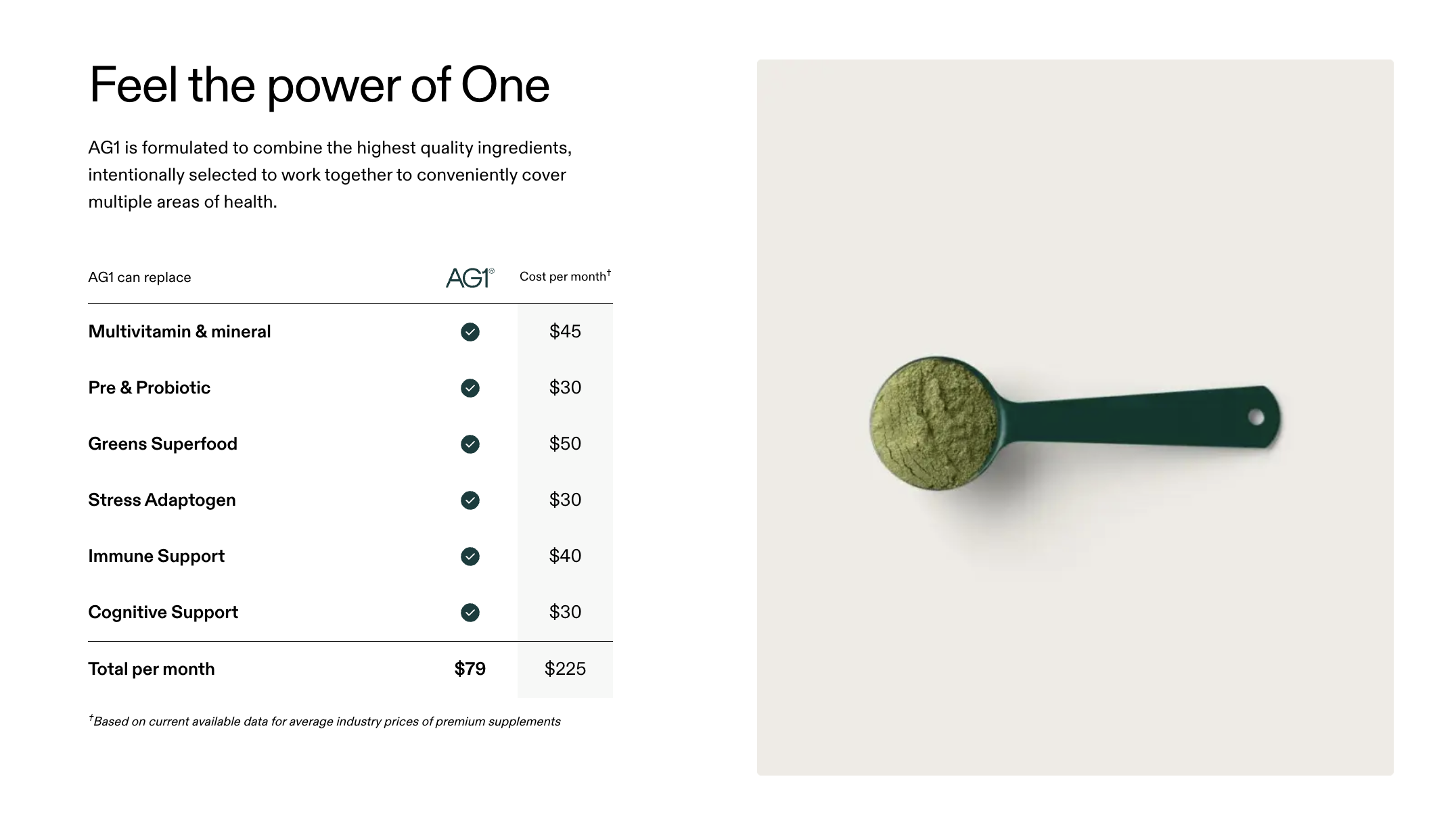
The above screenshot from AG1's website illustrates the claim that they "conveniently cover multiple areas of health." They use the side-by-side cost comparison to imply that as a product it replaces the standalone versions and saves the customer $146/month.
As reviewed above, if you truly do take each of those standalone products, AG1 can't factually be verified to replace all of those types of supplements. Overall this claim is more marketing gimmick than fact-based statement.
Their Research
Most supplement companies can't claim to have research studies about their actual product. AG1 talks about three on their website:
- Clinical trial
- In vitro study
- Observational study
They also link to seven studies published in peer-reviewed journals. These journal publications are discussed in the next section in greater detail.
For now, let's cover the most important one: the clinical trial. In human studies that evaluate nutrients and drugs, randomized, double-blind, placebo-controlled studies are the gold standard. This allows for a meaningful comparison between a group that gets the intervention and one that doesn't. Nutrition research is still complex and there are always limitations and variables. But this type of study design offers the best chance to assess data for real-world impacts.
The Clinical Trial: AG1's version
Here is what the AG1 website describes about their clinical trial:
- 30 healthy adult participants
- Ages 21-49
- 1 month study period
They collected stool samples as their source of data, to assess the digestive impact of AG1. They say that they conducted research with a third-party expert to validate and mitigate bias. This is a relevant point since most scientists consider company-funded research of their own product to be biased.
What did their study find? Click each image to view, or I've summarized below.
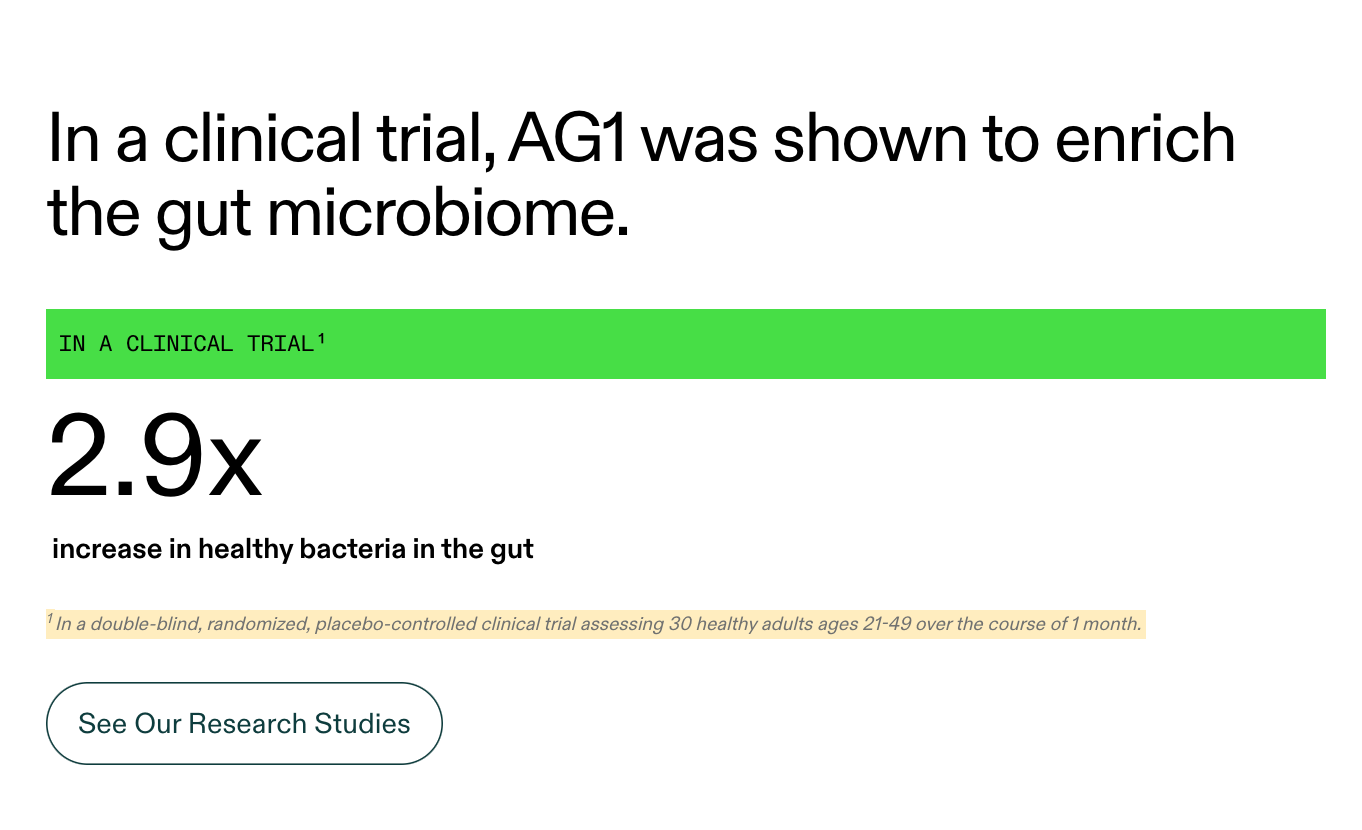
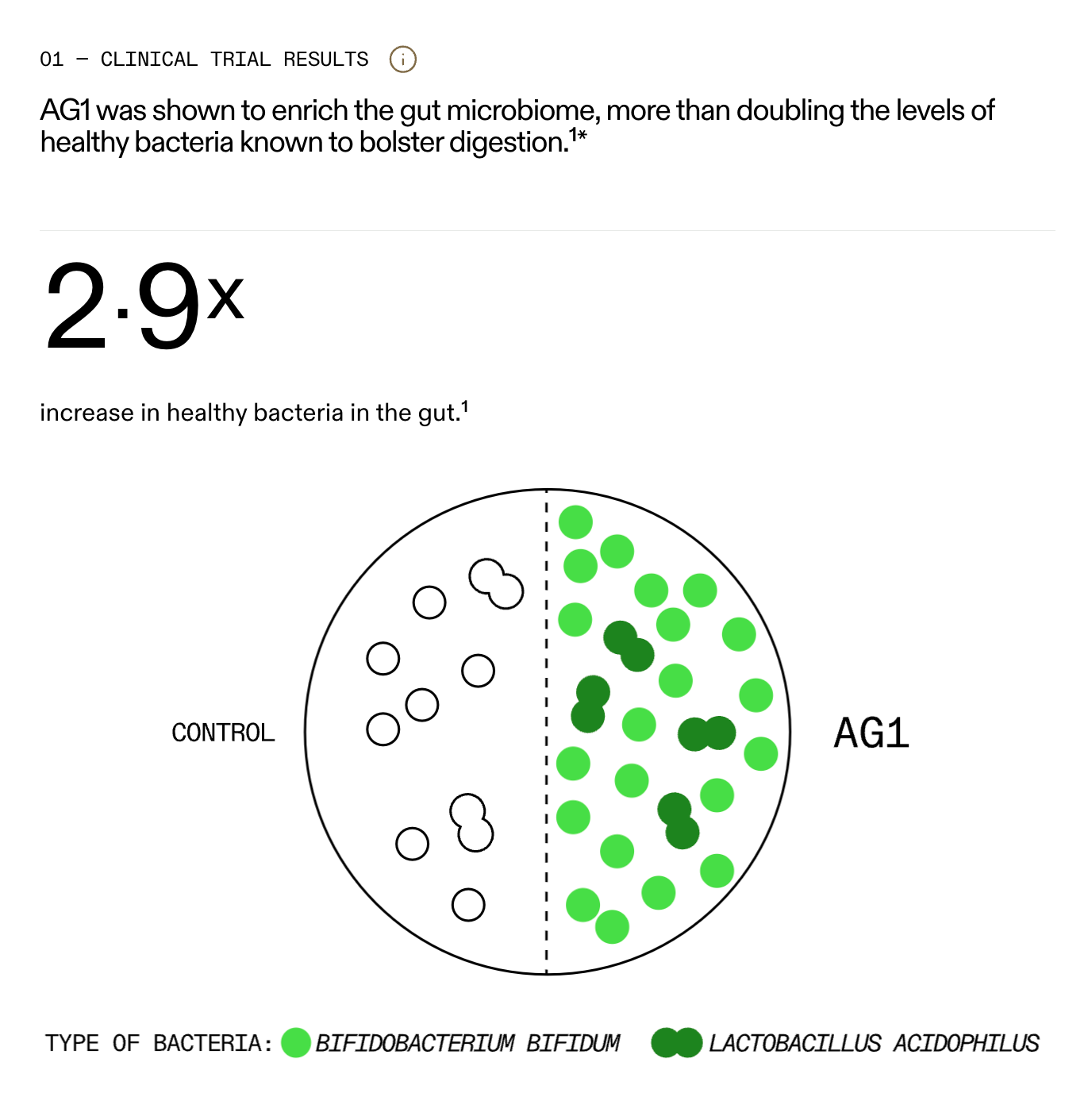
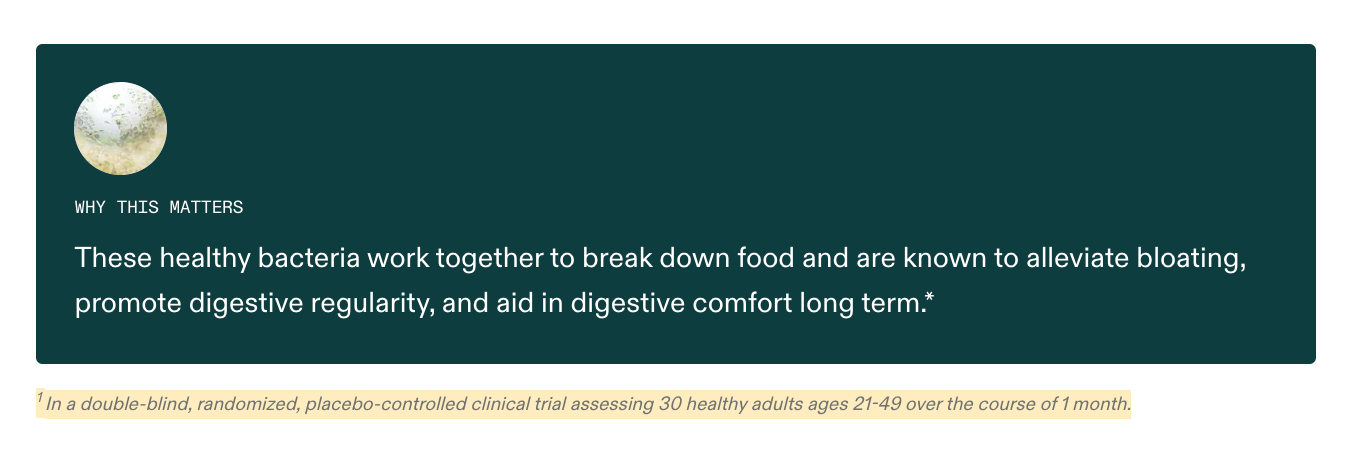
Screenshots of AG1 website. Captured on 9/21/24.
Here's what they say:
- AG1 enriched the gut microbiome, leading to a 2.9x increase in healthy bacteria in the gut, compared to the control group who did not seem to have these results.
- They state that this is significant because these bacteria break down food, alleviate bloating, promote digestive regularity, and aid in long-term digestive comfort.
On their website, under these graphics, there's a button that says "See our research studies." However, this clinical trial isn't linked there, nor could I find it anywhere online.
I reached out to the company and asked them to provide a link to their peer-reviewed, published results. Below is their response. I will update this entry if new information becomes available.
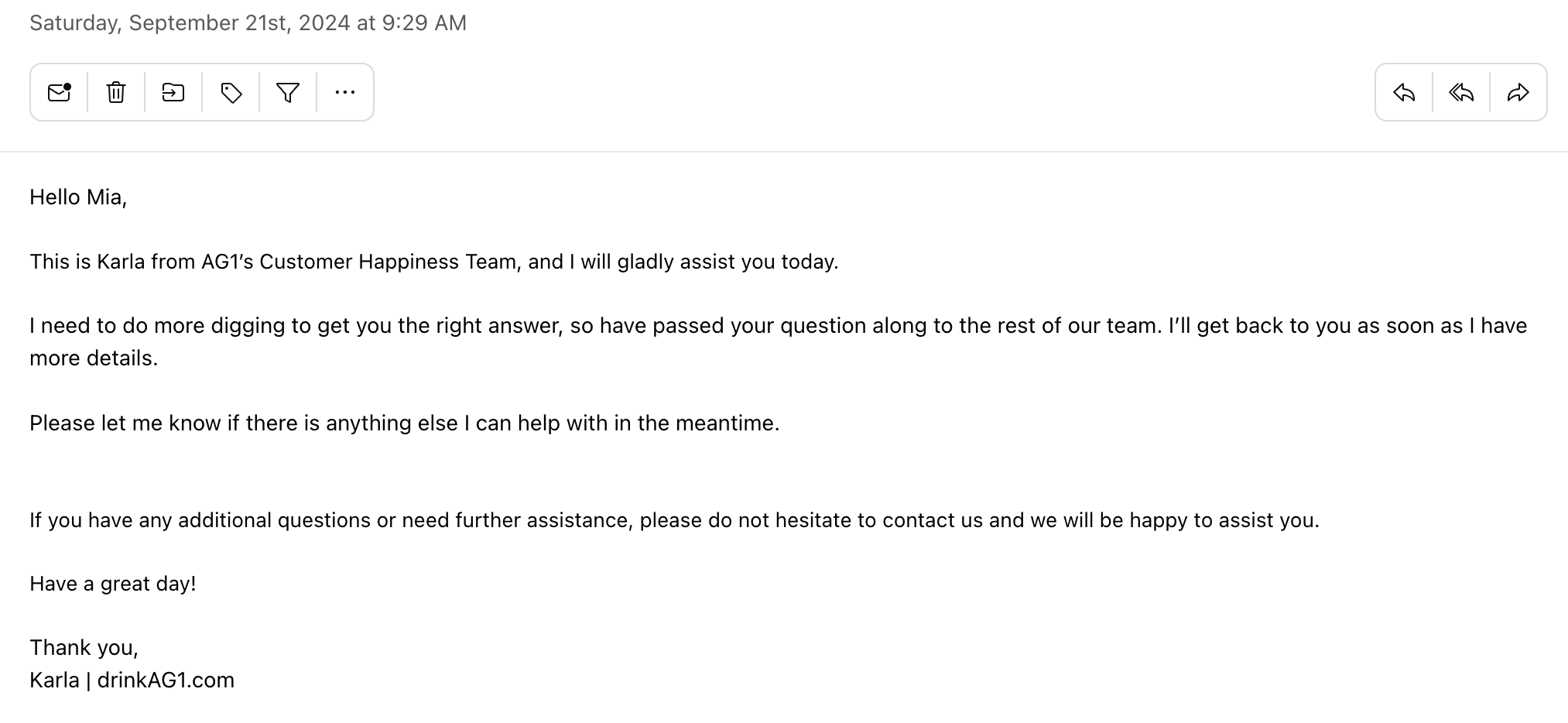
Update: On 9/24/2024, I received a reply from Athletic Greens with the following statement: "Our clinical trial publication is currently under peer review, and we will post it to our website as soon as it is accepted."
I will check for this information, and will update this article when I can review their published results.
The Clinical Trial: Peer-reviewed version
I could not find the peer-reviewed, published results of this clinical trial. I searched PubMed, Google Scholar, and my academic library database.
All I found was the clinical trial registration, which does provide some details. The last update was from March 2024. No results have been posted or published.
- The study began in August 2023 and was completed in October 2023. It was conducted in Ohio at the Center for Applied Health Sciences.
- It enrolled 30 "apparently healthy" people, which was defined as a body mass index between 18.5-29.9, a body weight of at least 120 pounds, normal blood pressure, and a resting heart rate less than 90 BPM.
- Subjects had to agree to avoid exercise and caffeine for 24 hours before clinic visits and to fast for 10 hours prior to specimen collections.
- They were asked not to change their dietary and physical activity patterns during the study period.
- Below is an image of the exclusion criteria:
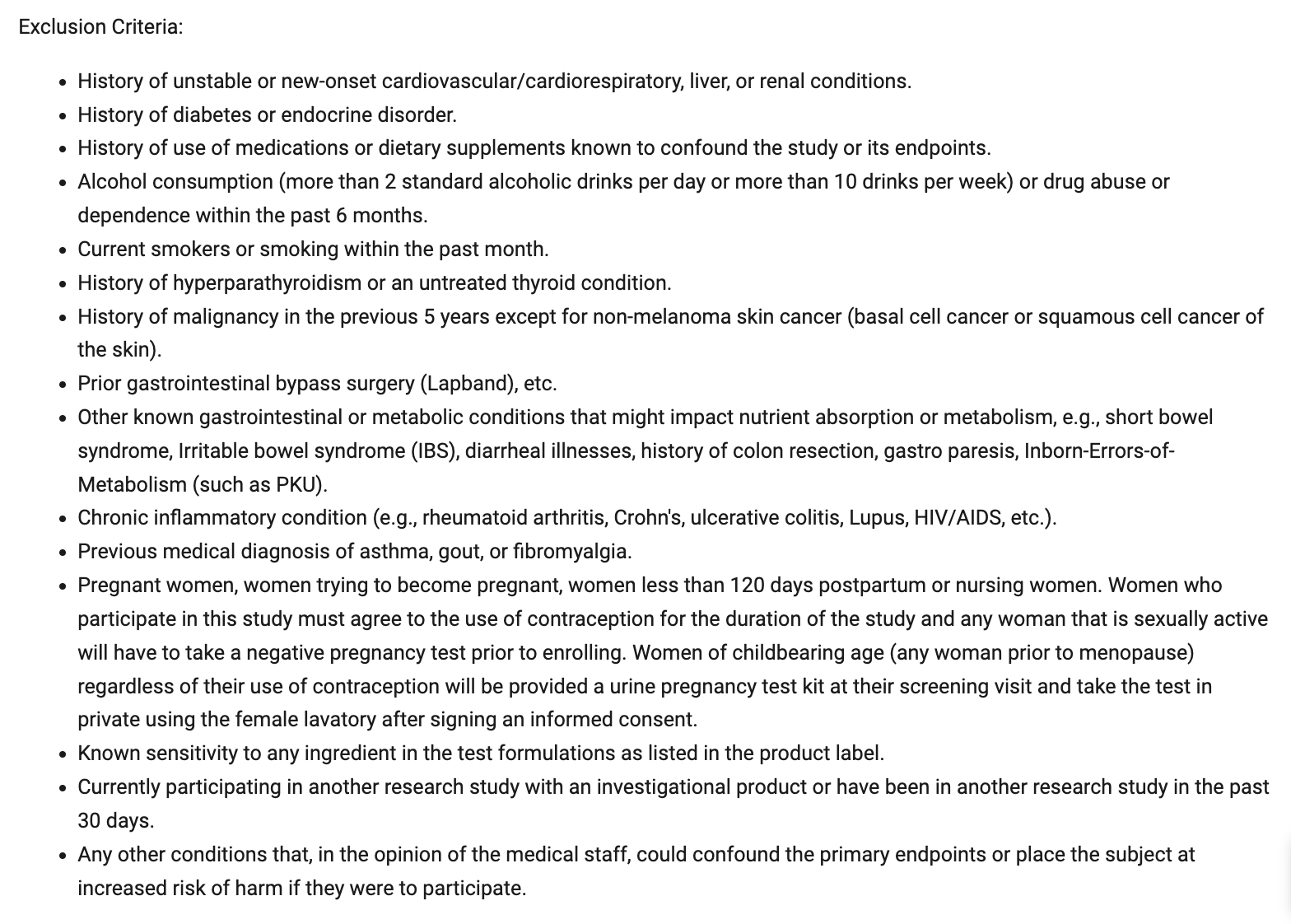
The study was primarily measuring the gut microbiome, with several secondary outcomes. Here's the data they collected:
- Stool samples to assess gut microbiome structure, function, and metabolic pathways.
- Laboratory samples including complete metabolic panel; complete blood count; nutrient concentrations for zinc, magnesium, vitamin C, and folate.
- Digestive quality of life questionnaire.
- Bristol stool scale and reports on stool consistency and frequency.
While they report at least some of the outcome of the gut microbiome composition on their website, they didn't describe the results of all this other testing. Without being able to read the peer-reviewed write-up, it's also impossible to know more about the participant demographics (gender, race, etc.) or the study's limitations.
When I assess a study, I consider many elements, but I always have to consider what may have been left out.
- They only had 30 participants, which is the bare minimum needed for most statistical analysis to produce a meaningful result. Even so, the type of statistical analysis matters. What methods were used to come up with their reported numbers?
- Did all 30 complete the study? While they enrolled 30, there could have been any number of drop-outs. Were the numbers they reported on their site based on 30 people or fewer? This is extremely relevant.
- Did they collect data about the participants' usual diets? Did they ensure that "usual diets" were comparable between both groups? This could be relevant because if, even by randomized chance, the intervention group had a diet that contained more prebiotics or probiotics, it could influence the data they were collecting.
- What were the study’s limitations? In addition to potential drop-outs, the small sample size is a significant limitation. Lack of gender/race diversity could also be a limitation, as well as the age of subjects. The quality of the research can't be analyzed if we don't have all the info.
- They noted that they had third-party analysis to mitigate bias, but what specifically does this mean? I'd want to read the study's conflicts of interest disclosure to understand more.
My biggest question is why didn't AG1 publish this study? I hope that the company follows up with me and sends me this information. Until then, too many questions remain:
- Did the secondary measurements show no differences between those who took the supplement and those who didn't?
- Did the supplement group show worse measurements from baseline?
- Did the control group improve, but the supplement group didn't?
- Were there too many drop-outs, and if so, what led them to quit?
Bottom line: AG1's claim to be backed by clinical trial results is, at this point, more marketing verbiage than scientific fact.
Peer-Reviewed, Published Research
Here's a breakdown of the seven studies that AG1 does list on their research page. It's important to note that the results most needed to determine how AG1 might impact human health (the clinical trial results) are not available online.
In Vitro Research
The one that gets the most graphic buzz on the AG1 website is their in vitro study. It's also the research type with the least relevance to human consumers, so I'm not going to get too deeply into this.
Their in vitro study results have been published in Nutraceuticals. Here's why this type of research doesn't matter as a human consumer considering whether a supplement will help you or not:
Human bodies are biologically and physiologically complex. Research that shows benefits in a cell, test tube, or other lab model can't replicate the complexity of the entire human organism.
Any potential research benefits that come from this type of study can help scientists design future clinical trials, but they cannot tell us how the product will work in the human body. Here are the researchers' own words (bolding mine):
Even so, the AG1 website highlights the benefits of this study in a way that makes them seem very relevant to a consumer's questions over how it works and what benefits it might give them.
Their in vitro research was also published in Applied Biosciences. The abstract discusses their goal to assess bioavailability and accessibility of minerals. These are important questions consumers often ask: will the product work? How do I know it will absorb?
This study, however, can't answer that question for the human body. The researchers note that human digestion and absorption is far more complex than the study's simulator model. They also mention that it's hard to know with certainty how mineral absorption would work in the human body since AG1 also contains other ingredients that could influence the availability, like probiotics, phytonutrients, and fiber.
They also published their in vitro research in Current Issues in Molecular Biology. Again, this has the same concerns already mentioned. It's not a human body. In the researchers' words, the study had limitations that "warrant interpretation of the data to be taken with caution."
The AG1 team's research about the product's performance in the context of a simulated, non-body model were also published in Microorganisms and the Journal of Functional Foods, but the same limitations remain: we still don't know what it does in humans.
Fact-check: Misleading, especially since the website leans heavily on their research and science foundation. Professional researchers know that this data is not helpful for anyone trying to assess the effectiveness of a product in the human body.
Review Articles
The AG1 team has published review articles in Frontiers in Nutrition and Nutrients, but this isn't anything new or original, so can't be used as proof of effectiveness for the AG1 product.
Fact-check: Misleading, since this type of peer-reviewed research can't offer proof of effectiveness.
Observational Study
I did not find the published results of the observational study either, but this almost doesn't matter, since the study design doesn't allow for a cause-and-effect inquiry. It won't really help us determine, in an unbiased way, if the supplement itself did anything.
Conflicts of Interest
Any time a company funds research for their own product, a conflict of interest has to be considered. This does not automatically discredit all results. However, reading the fine print disclosures at the end of a study illustrates the biggest concern, outside of inherent bias toward the product's benefits:
When assessing research, we have to consider what has been said alongside what may have been omitted. If a study's results came back negative or showing no effect, the company could decide not to publish the outcome, especially if they felt it would harm their brand's reputation or marketing success.
The serious concern with this is that for the scientific method, all results from all studies need to be published. Null, or negative, results are also valuable, because they help shape future studies. When a study is funded by the NIH or other research-focused organizations, null results will be published. When research is sponsored by the company, null results could be shelved. There's no way of knowing if AG1 has done this, only that it raises the question in any context of industry-funded research, if every outcome and data point was released to the scientific community.
Fact-Check Results
- Predominantly unsupported claims
- Misleading use of peer-reviewed scientific research to imply credibility




